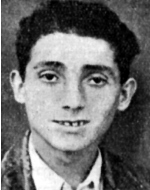Gliday (Eisler), Shlomo-Ya’akov
Aon of Esther-Malka and Ze’ev, was born in 1923 in the village of Roztuka, then Carpathian Russia (then Czechoslovakia) to an agricultural family with nine children. He studied in a “cheder” and in a public elementary school, and defended with his fist and stone his Jewish honor against the wounds of his fellow Christians. In 1938, when the rope was returned to Hungarian rule, he moved to Budapest and, in a school for apprentices, he learned the art of baking. At the beginning of the Second World War, when there was a shortage of bread in the Hungarian capital, because of the increased supplies sent to Germany, he bought friends in high-ranking circles with bread and pastries he secretly supplied to him and used these contacts to free his father, who was sent to a concentration camp In the village. But when the Germans took control of Hungary he could no longer save his parents from deportation to extermination in Auschwitz. He himself was saved by forged Christian documents and helped many Jewish boys to be saved in this way and saved them from starvation by the bread he had secretly given them. In the winter of 1944 he was arrested for being informed that he was a Communist. With the approach of the Russians to Budapest, he was sent to Germany with hundreds of Jewish prisoners, under guard of the Gestapo. On the way he took part in disarming their guards and releasing all the prisoners. He managed to hide until the defeat of the Germans and wandered in Hungary, Romania, Czechoslovakia and the Carpathian Russia to search for remains from the family. In the city of Mukachevo, the Russians offered him to run a cooperative bakery. He agreed to go to work after he returned from arranging his affairs in Budapest. There he found two sisters and a brother and together they found a brother in Italy who was a soldier in the Jewish Brigade, and in the fall of 1945 they all immigrated to Israel. He joined the “Alumim” group of HaPoel Hamizrachi in Herzliya and soon became a sabra who knows Hebrew, is rooted in the life of the country and is ready for any hard work. As a member of the Haganah since his arrival in active duty in the Alexandroni brigade since the beginning of the War of Independence, he participated in all the battles from Wadi Ara through Tel Litvinsky, Hiriya, Sakia, Salameh, etc. to Latrun. He was known as a quick and devoted soldier (even when there was no “state of alert”, he rejected his brother’s pleas to stay with them on a vacation day, lest he be needed). When the Arab legion entered the fighting, the situation in Jerusalem worsened and the road to it was cut off by the Legion of Latrun, and Ben-Nun A was meant to break through the road. The task was assigned to the newly established brigade 7, which was to conquer Latrun and reach the Jerusalem area, and was reinforced with a battalion of the Alexandroni Brigade, in accordance with which the battalion was assigned from Alexandroni to conquer Latrun. Shortly after they left, they encountered Legionnaires, who turned out to be better and were aided by cannons, armored vehicles, and armored vehicles. In view of the enemy’s superiority and harsh weather conditions, many of the fighters fell, and on this day, on May 12, 1948, on the fifteenth day of the month of Iyar, he fell and was brought to rest at the military cemetery on Mount Herzl in Jerusalem.
